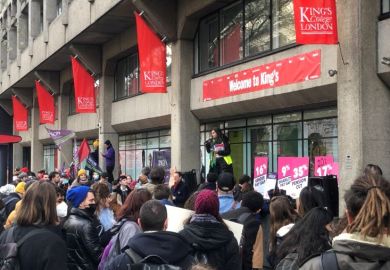Academics who brought a High Court case against the directors of UK higher education’s largest pension fund have promised to appeal after a judge dismissed their claim.
Neil Davies, of the University of Bristol, and Ewan McGaughey, of King’s College London, argued that those in charge of the University Superannuation Scheme (USS) “failed to act within their powers” when they conducted a controversial valuation during the height of the Covid-19 pandemic which predicted a deficit of between £14.9 billion and £17.9 billion and led to cuts to members’ benefits.
Their case – which was funded through donations of more than £220,000 – also alleged discrimination, accusing the directors of ignoring the disproportionate effect of the cuts on women, ethnic minorities and young people. A third claim related to USS’ operating costs that were called “super-inflationary” and amounted to a breach of duty by the directors in allowing such an increase. Fourthly, the claimants alleged that the directors failed to act in members’ best interests by refusing to stop investing in fossil fuels, going against the findings of a survey that found most members favoured the move.
Judge Mr Justice Leech dismissed an application to progress the claims as, based on the evidence submitted by both sides, he ruled that the claimants had not demonstrated a prima facie case that would justify the expense of a full trial.
A key test used in assessing the case was that the court needed to be persuaded there had been a deliberate or dishonest breach of duty or the directors had improperly benefitted themselves at the expense of the USS.
In a joint statement, Dr Davies and Dr McGaughey welcomed an acknowledgement from the court that beneficiaries of a pension fund have the right to sue directors for breach of duty, and said that their case had been dismissed “on a technicality” dating back to 1843.
“He [the judge] says duties cannot be enforced unless directors personally benefit from their breach. We are confident that this decision is wrong,” their statement said.
“The statutory duties of directors are to follow the rules of their companies, use their powers for the company’s purposes, act in good faith, and not engage in conflicted conduct. Statutory duties must not be defeated by common law technicalities in enforcement. The law is on the side of accountable governance and secure retirement.”
They pledged to “explore every avenue of appeal” to “win justice for the hundreds and thousands of university staff who deserve social security”.
Critics have said that the 2020 USS valuation was too conservative and underestimated the speed of the economic recovery after the pandemic. They say that the finances of the fund have since bounced back considerably and cuts to benefits are no longer necessary, or at least should be postponed until another valuation – due next year – is concluded. This academic year there have been 13 days of strike action at dozens of universities, while some members of the University and College Union are currently conducting a marking boycott in protest at the pensions changes.
“We are organised, and determined to bring accountability to the directors of USS for the harm they have caused…the cuts are billions, but if we all stick together, we will win,” the claimants’ statement concluded.
A USS spokesman welcomed the judgment and the “thoroughness” with which the judge assessed the case.
“Whilst pleased with that outcome, we are concerned that anyone should feel it necessary to take such action. We are committed to moving forward and to building stronger relationships with all stakeholders,” the spokesman added.
“Much of the material considered by the court was already available on our website. We encourage members to make use of that information to help them better understand the scheme and how we run it for them.”
It was the second legal win for the pension scheme in the past week, after a former director, Jane Hutton, withdrew her case for wrongful dismissal that she had brought in response to being removed from her post for disclosing information to outside sources.
Register to continue
Why register?
- Registration is free and only takes a moment
- Once registered, you can read 3 articles a month
- Sign up for our newsletter
Subscribe
Or subscribe for unlimited access to:
- Unlimited access to news, views, insights & reviews
- Digital editions
- Digital access to THE’s university and college rankings analysis
Already registered or a current subscriber?








